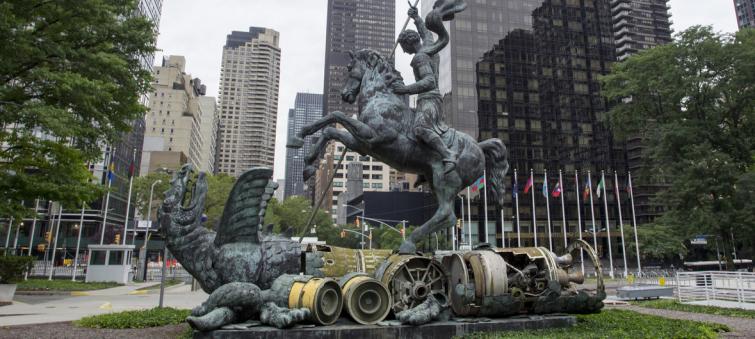
Prospect of a nuclear war ‘higher than it has been in generations’, warns UN
New York, Apr 3 (IBNS): In a world defined by “competition over cooperation, and the acquisition of arms, prioritized over the pursuit of diplomacy”, the threat of a nuclear weapon being used is “higher than it has been in generations,” the Security Council heard on Tuesday.
The warning came from Izumi Nakamitsu, the UN High Representative for Disarmament Affairs, in a meeting convened in support of the Non-Proliferation Treaty (NPT), ahead of the next conference to review the historic accord, scheduled for 2020.
The possible use of nuclear weapons is one of the greatest threats to international peace and security Izumi Nakamitsu, UN High Representative for Disarmament Affairs
The NPT, which entered into force in 1970, represents the only multilateral, binding commitment to the goal of disarmament by the States which officially stockpile nuclear weapons.
Its objective is to prevent the spread of nuclear weapons and weapons technology, to promote cooperation in the peaceful uses of nuclear energy and to further the goal of achieving nuclear disarmament and disarmament overall.
Nakamitsu said that the use of nuclear weapons, “either intentionally, by accident, or through miscalculation”, is one of the greatest threats to international peace and security, and that “the potential consequences of a nuclear war would be global and affect all Member States.”
The Treaty, she said, is widely acknowledged as “the cornerstone of the international non-proliferation regime and the essential foundation of nuclear disarmament. Its role as a pillar of our collective security is likewise an accepted fact.”
From disarmament success to “dangerous rhetoric”
The disarmament chief described the two pillars of the NPT – disarmament and non-proliferation – as “two sides of the same coin”, adding that “backward movement on one will result in backward movement on the other.”
Unfortunately, Nakamitsu was able to cite several examples, including the use of “dangerous rhetoric” about nuclear weapons’ use; an increased reliance on nuclear weapons in security doctrines; and modernization programmes to make nuclear weapons faster, stealthier and more accurate.
The durability of the NPT, which has lasted for almost half a century, cannot be taken for granted, she insisted, adding that there is currently nothing to replace the disarmament and arms control framework which is foundational to the post-Cold War era.
With the Treaty coming under increasing stress, the upcoming Review Conference in 2020 will, she said, be a “defining moment.” It could either highlight divisions between States and raise questions about their willingness to seek collective security for all, or present “a golden opportunity to make the practical gains that will ensure the Treaty’s continued viability.”
Iran, North Korea nuclear programmes ‘top of the agenda’
Director General of the International Atomic Energy Agency (IAEA), Yukiya Amano, also briefed the Council, reminding members of the role that the Agency plays in the implementation of the NPT; in the creation of an environment “conducive to nuclear cooperation”; and in assisting developing countries to use nuclear energy for peaceful means.
However, Amano said the IAEA was facing several challenges, including the steady increase in the amount of nuclear material in circulation, the number of nuclear facilities under IAEA safeguards (the system of inspection and verification of the peaceful uses of nuclear materials), and continuing pressure on the Agency’s budget.
He told the Council that monitoring the nuclear programmes of Iran and North Korea, officially known as the Democratic People’s Republic of Korea (DPRK), are among the top items on the IAEA’s agenda.
Mr. Amano said that Iran was implementing its commitments under the UN-backed Joint Comprehensive Plan of Action, whose future has been put in doubt by the decision of the US administration to withdraw from the agreement. After 2009, he said, there have been “no credible indications of activities in Iran relevant to the development of a nuclear explosive device.”
As for the DPRK, Amano said that the country’s nuclear programme has significantly expanded over the past decade, carrying out nuclear tests on five separate occasions since 2009, despite the recent lull. With no inspectors inside the country, the IAEA monitors the situation using tools such as open-source information and satellite imagery.
Security Council reaffirms support for nuclear treaty
In a statement released following the meeting, the Security Council announced a reaffirmation of its members’ support for the Non-Proliferation Treaty, and a commitment to “advance the goals of the NPT as the cornerstone of the nuclear non-proliferation regime and the foundation for the pursuit of nuclear disarmament and the peaceful uses of nuclear energy.”
Describing the NPT commitments taken under the treaty as viable and mutually reinforcing, the statement underscored the need for its full implementation, and the importance of achieving universal adherence to the Treaty.
The Council members agreed that the 2020 NPT Review Conference will provide an opportunity for an unambiguous reaffirmation of commitment to the Treaty, a commemoration of its historic achievements, and the strengthening of the nuclear-disarmament and non-proliferation regime.
UN Photo/Rick Bajornas
Support Our Journalism
We cannot do without you.. your contribution supports unbiased journalism
IBNS is not driven by any ism- not wokeism, not racism, not skewed secularism, not hyper right-wing or left liberal ideals, nor by any hardline religious beliefs or hyper nationalism. We want to serve you good old objective news, as they are. We do not judge or preach. We let people decide for themselves. We only try to present factual and well-sourced news.







